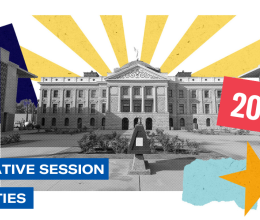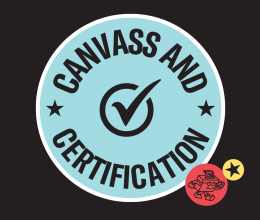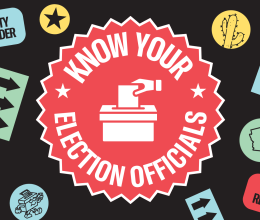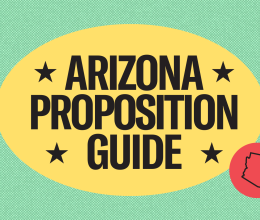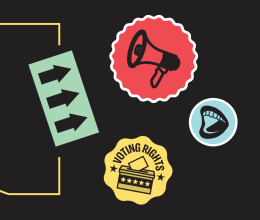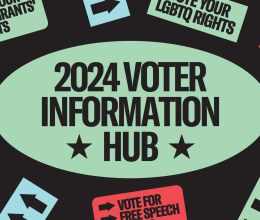
Can I check the status of my ballot-by-mail/early ballot?
Check the status of your ballot-by-mail/early ballot here
If there is a problem with the signature on a ballot-by-mail/early ballot it can be corrected up to 5 days after the election.
For information about how to correct problems contact your county recorder’s office here.
NOTE: in Maricopa County, signatures can often be corrected by text or phone.
What should I do after Election Day if I was required to complete a provisional ballot?
Check the status of your provisional ballot
If you completed a conditional provisional ballot because you did not provide I.D., you must complete identification verification with your county recorder 5 days after Election Day. This year, the deadline to verify I.D. is November 10.
Find your county recorder’s contact information here.
Additional information
If you are turned away or denied a provisional ballot, call the Election Protection Hotline at 1-866-OUR-VOTE or 1-888-VE-Y-VOTA (en Español).
Report your experience to local election officials.
Problem: My mail-in ballot has not been accepted because there is an issue with my signature.
Before counting all ballots by mail and early ballots, election officials must compare the signature on the green affidavit envelope with the voter’s signature in the voter’s registration record. If they are not satisfied that the signatures match, the county recorder shall make reasonable and meaningful attempts to contact the voter by mail, phone, text message, and/or email to notify the voter of the inconsistent signature. You should, therefore, receive notice of the signature mismatch and have an opportunity to correct it. The process of allowing voters to fix issues on their ballot is known as ballot curing.
What is the deadline to correct issues with my signature on my Mail/Early Ballot?
You can correct your signature mismatch until Sunday, November 10, 2024, at 5:00 pm. If you do not cure your signature by this time, your ballot will be rejected.
If your ballot is rejected because it was missing a signature, you must cure the missing signature by 7:00 pm on Election Day.
How can I correct issues with my signature on my mail-in ballot?
County officials will provide you with options to correct your signature in the notice they sent you. In all counties, you can correct your signature by visiting your local county recorder’s office in person. Their offices will be open:
- Monday, November 4, from 8 am – 5 pm
- Tuesday, November 5 (Election Day), from 8 am – 7 pm
- Wednesday, November 6, 8 am – 5 pm
- Thursday, November 7, 8 am – 5 pm
- Friday, November 8, 8 am – 5 pm
- Saturday, November 9, 8 am – 5 pm
- Sunday, November 10, 8 am – 5 pm
Find Your County Recorder’s Contact Information Here
Alternatives to curing your ballot in-person
Some counties may provide additional ways to correct your signature.
Election officials in some counties will verify your identity over the phone using certain personal identifiable information contained on your voter record. In other counties, you can cure through a text program that provides you with a link to a secure portal where you can validate your signature and verify your identity by uploading an image of your Arizona Driver License or Arizona State ID. Be sure to check your County Recorder’s website to see which methods are available.
Problem: My ballot was challenged. What do I do?
Arizona law ONLY authorizes challenges to ballot by mail or early ballots on one of the following grounds:
- The voter has voted more than once in this election
- The voter is not the person whose name appears on the register
- The voter has not resided in the State for 29 days preceding the election or other event for which the registrant’s status as properly registered is in question
- The voter is not properly registered at an address permitted
- The voter is not a qualified registrant. See the Secretary of State’s website for a list of the voter qualifications.
Challenges may NOT be made on the following grounds. If a challenger says you are ineligible for one of the following reasons, their challenge should be dismissed:
- Your race, national origin, appearance, surname, language, or religion
- You registered to vote using the State or federal form and did not provide documentary proof of citizenship
- You moved from one address within the county to another within the county
If a challenge has been made to your ballot-by-mail or early ballot, election official must mail you a notice of the challenge, a copy of the challenge, and the time and place of the hearing where you can defend the challenge within 24 hours after the challenge was accepted.
These materials will be sent to the address shown on your request for the ballot-by-mail. If no address was provided, that is listed as part of your voter registration record. Additionally, you might also get notice via a phone call to the phone number or email to the email address in your registration record.
Your county’s Early Election Board will schedule a hearing for your challenge. This hearing must occur by 5:00 p.m. on Monday, November 11, 2024, but cannot be any sooner than 96 hours after the notice was mailed OR 48 hours if the notice was sent overnight or hand delivered. This is an informal opportunity to submit brief statements regarding the challenge.
You can optionally attend your hearing in-person or you submit a written statement addressing the challenge, but not attending or responding will not count against you. It is on the challenger to show by clear and convincing evidence why your early ballot should not be counted. This means that they must provide sufficient, individualized facts to establish a conclusion that is highly probable or reasonably certain.
The Early Election Board will ultimately decide whether to count your vote — whether you attend, submit a statement, or refrain from addressing the challenge. If your ballot is rejected, the board will send the voter a notice stating whether the early ballot was disallowed and provide the grounds for the determination. Their decision is final.
Responding to your challenge
You have the right to submit a brief statement to your county elections explaining why whichever of these challenges has been raised why it does not apply to you.
If the reason for the challenge is not allowed by Arizona law (see above), you can say that the challenger has failed to raise a valid challenge and it must be dismissed immediately.
If the challenge raises one of the reasons allowed by Arizona law (see above), provide information to counter any claim that you are ineligible to vote. This may mean including:
- A statement identifying yourself; and that you are a U.S. Citizen, at least 18 years old and otherwise qualified to vote.
- A statement detailing any efforts you made to provide documentary proof of your citizenship. Not all voters in Arizona need to provide documentary proof of citizenship, and this should not be the reason for a challenge, so if this is the reason provided, you should contact 1-866-Our -Vote.
- A statement that you have not voted previously in the current election or an explanation of past, unsuccessful attempts to vote in the current election.
- A statement explaining why you have not been living at the address listed on your voter registration for the last 29 days. This statement might explain that you are a student or in the armed services.
- A statement detailing when and how you registered to vote.
- A statement detailing any recent efforts to correct mistakes or changes in your voter registration.
If you have any questions or need assistance with responding to a ballot challenge, please contact the Election Protection Hotline at 1-866-Our-Vote.
I need to find my polling place
Arizona voters have the option to vote in-person on during the state’s early voting period and on Election Day. In 2024, early in-person voting begins October 9 and ends October 29. Election Day is November 5.
What to do
Find your polling place or vote center and its hours of operation
Make a plan to vote: when, where, and how will you cast your vote, what I.D. documents will you need to bring, and how will you get there?
Types of voting locations by county
Cochise, La Paz, Maricopa, Navajo, Pima, Santa Cruz, Yavapai and Yuma counties have voter centers, so voters can vote in-person on Election Day at any location.
Coconino, Gila, Graham, and Greenlee use a hybrid model: these counties have vote centers where voters can vote in-person on Election Day at any location AND other polling locations that are restricted by precinct. Voters can choose to go to any vote center or the polling location in their assigned precinct.
Apache, Pinal, and Mohave restrict polling location by precinct.
PINAL COUNTY VOTERS: You MUST vote at the correct polling place on Election Day. If you are at the wrong polling place, you will not be allowed to vote. Be sure to check your assigned polling place to ensure your vote counts.
What do I need to bring to the polls?
In Arizona, every voter is required to show proof of identity when voting in person. There are three types of I.D. you can use:
- Photo I.D. that includes your name and address that matches the information you registered to vote with. (one required) OR
- Two identifying documents without a photograph that include your name and address that matches the information you registered to vote with, such as a bill or bank statement, OR
- One photo I.D. that includes your name but does not have an address that matches the address you registered to vote with AND one identifying document with your name and address that matches the information you registered to vote with.
What are my general rights on Election Day?
Every voter has the right to cast their ballot and have their vote counted. Our democracy needs all of us to fully and fairly participate.
If the polls close while you’re still in line, stay in line – you have the right to vote.
If you make a mistake on your ballot, ask for a new one.
If you run into any problems or have questions on Election Day, call the Election Protection Hotline:
English: 1-866-OUR-VOTE / 1-866-687-8683
Spanish: 1-888-VE-Y-VOTA / 1-888-839-8682
Arabic: 1-844-YALLA-US / 1-844-925-5287
Bengali, Cantonese, Hindi, Urdu, Korean, Mandarin, Tagalog, Vietnamese: 1-888-API-VOTE / 1-888-274-8683
I am a voter with a disability
Your rights
Under federal law, all polling places for federal elections must be fully accessible to older adults and voters with disabilities. Simply allowing curbside voting is not enough to meet Americans with Disabilities Act (ADA) accessibility requirements.
In federal elections, every polling place must have at least one voting system that allows voters with disabilities to vote privately and independently. Usually, this is a machine that can read the ballot to you (for people with vision disabilities or dyslexia), and let you vote by pushing buttons (for people with mobility disabilities).
Under federal law, voters with disabilities and voters who have difficulty reading or writing English have the right to receive in-person help at the polls from the person of their choice. This helper cannot be the voter’s employer, an agent of the voter’s employer, or an agent or officer of the voter’s union. The helper must respect the voter’s privacy, not looking at the voter’s ballot unless the voter asks them to do so.
Election officials (including poll workers) must make reasonable accommodations as needed to help you vote.
Election officials must provide you with help if it’s possible for them to do so.
A voter with a mental disability cannot be turned away from the polls because a poll worker thinks they are not ‘qualified’ to vote.
What to do
You can bring a family member, friend, or another person of your choice to assist you at the polls. Do not bring your employer, or an agent of your employer or union.
If you bring a person to assist you, let the poll workers know that when you check in. They may ask you to swear under oath that you have a disability and that you have asked that person to help you. Your helper may also be required to sign a form swearing that they did not tell you how to vote.
If there are long lines and you have a physical or mental health condition or disability that makes it difficult for you to stand in line, tell a poll worker.
Tell election officials what you need. For example, if it’s hard for you to stand, they should provide you with a chair or a place to sit while you wait. If the crowds or noise are hard for you, election officials can find a quiet place for you to wait and call you when it’s your turn to vote.
If you are not able to enter your polling place because the pathway to it is not fully accessible, ask poll workers for curbside assistance. Also call 1-866-OUR-VOTE to report the issue.
If you have difficulty using the materials provided to make your ballot selections, review, or cast your ballot, let a poll worker know and ask for the help you need. Accessibility is the law.
If you face any challenges in voting privately and independently or are unable to cast your vote, report the problem to the Election Protection hotline at 1-866-OUR-VOTE. Trained attorneys can assist you and make sure that other voters do not experience the same problem.
Additional information
Find detailed voting guides at Bazelon Center for Mental Health Law
For a toolkit on voting with a disability, visit the Autistic Self Advocacy Network.
Visit SABE’s GoVoter Project for accessible trainings on how to exercise your rights as a voter with a disability.
Take a course on polling place accessibility requirements at the Rocky Mountain ADA Center.
For voting in formation in American Sign Language, visit SignVote.
I speak English less than “very well”
Your rights
Under federal law, voters who have difficulty reading or writing English may receive in-person assistance at the polls from the person of their choice. This person cannot be the voter’s employer, an agent of the voter’s employer, or an agent or officer of the voter’s union.
Counties covered by Section 203 of the Voting Rights Act are required to provide bilingual assistance to voters in specific languages. This means that they must provide poll workers who speak certain languages, and make all election materials and election-related information available in those languages. Check whether your county is required to provide bilingual election assistance in a language you speak.
What to do
You can bring a family member, friend, or other person of your choice to assist you at the polls. Do not bring your employer, or an agent of your employer or union.
If you live in a county that’s required to provide bilingual voting assistance for a language you speak, you can request oral assistance from a bilingual poll worker and ask for voting materials, such as a ballot, in that language.
If you have trouble voting due to lack of English fluency, call one of these hotlines:
English: 1-866-OUR-VOTE / 1-866-687-8683
Spanish: 1-888-VE-Y-VOTA / 1-888-839-8682
Arabic: 1-844-YALLA-US / 1-844-925-5287
Bengali, Cantonese, Hindi, Urdu, Korean, Mandarin, Tagalog, Vietnamese: 1-888-API-VOTE / 1-888-274-8683
Additional information
For detailed guidance on bilingual voting assistance, visit Asian Americans Advancing Justice.
Problem: someone is interfering with my right to vote
Examples of voter intimidation
-
Aggressively questioning voters about their citizenship, criminal record, or other qualifications to vote.
- Falsely representing oneself as an elections official.
- Displaying false or misleading signs that voter fraud is a crime.
- Use of threat of physical force or verbal aggression.
- Aggressively asking a voter whom they are voting for, or trying to prevent a voter from voting by aggressive challenges (inside or outside of the policy place).
- Following a voter to the parking lot (and copying a license tag).
- Disrupting voting lines inside or outside of a polling place.
- Other forms of harassment, particularly harassment targeting non-English speakers and voters of color.
- Spreading false information about voter requirements.
NOTE: you do not need to speak English to vote in any state. You do not need to pass a test to vote in any state.
Your rights
It’s illegal to intimidate voters and a federal crime to “intimidate, threaten, [or] coerce … any other person for the purpose of interfering with the right of [that] other person to vote or to vote as he may choose.”
What to do if you experience voter intimidation
- In many states, you can give a sworn statement to the poll worker that you satisfy the qualifications to vote in your state, and then proceed to cast a ballot.
- Report intimidation to the Election Protection Hotline at 1-866-OUR-VOTE or 1-888-VE-Y-VOTA (en Español).
- Report intimidation to your local election officials. Their offices will be open on Election Day.
Problem: the poll worker says my name is not on the list of registered voters
Your rights
Voters are entitled to a provisional ballot, even if they aren’t in the poll book.
After Election Day, election officials must investigate whether you are qualified to vote and registered. If you are qualified and registered, they will count your provisional ballot.
What to do
Ask the poll worker to double check for your name on the list of registered voters. Make sure to spell your name out for the poll worker.
If your name is not on the list, ask if there is a supplemental list of voters.
If the poll worker still cannot find your name, confirm that you are at the correct polling place:
- Request that the poll workers check a statewide system (if one is available) to see if you are registered to vote at a different polling place.
- If the poll worker does not have access to a statewide system, ask them to call the main election office.
- You can also call 1-866-OUR-VOTE and ask for help verifying your proper polling place.
If you are registered at a different location, in most instances you will have to travel to that location to cast a regular ballot.
If the poll worker still cannot find your name or if you cannot travel to the correct polling place, ask for a provisional ballot.
Cochise, La Paz, Maricopa, Navajo, Pima, Santa Cruz, Yavapai and Yuma counties have voter centers, so voters can vote in-person on Election Day at any location.
Coconino, Gila, Graham, and Greenlee use a hybrid model: these counties have vote centers where voters can vote in-person on Election Day at any location AND other polling locations that are restricted by precinct. Voters can choose to go to any vote center or the polling location in their assigned precinct.
Apache, Pinal, and Mohave restrict polling location by precinct.
What are my rights if police are at the polls?
Law enforcement officers, whether uniformed or plain-clothes, should not be stationed within the 75-foot limit of a voting location. Exceptions may apply if the officer is voting, the voting location is within a public safety building, or if an officer is called to respond to a specific emergency.
Because many people, especially those belonging to historically marginalized communities, find the presence of police officers at polling locations intimidating, police officers should only be called to polling locations as a last resort. Arizona law designates election marshals to keep order in and around polling locations. Guidance from the Secretary of State instructs poll workers to take all reasonable efforts to de-escalate disturbances and seek further assistance from county election officials when these efforts fail. Under Arizona law, the marshal and election officials should only call law enforcement where there is violence or threats of violence, including any instance when a private citizen carries a weapon into the 75-foot limit in violation of Arizona law.
Law enforcement’s presence should be limited to the purpose of resolving the specific emergency, instance of violence, or threat of violence that precipitated the call. When responding to these calls, military and peace officers may bring weapons to polling places in the performance of official duties. In the event of an emergency, a law enforcement officer can aid in the transfer to a ballot box from a polling place.
Your Rights:
If law enforcement is at a voting location during Early Voting or Election Day or near ballot drop box, you should know that:
- Generally, and at voting locations, police officers MAY NOT inquire about your immigration status during initial consensual contacts. You have the right to remain silent and do not have to discuss your immigration or citizenship status with police, immigration agents or any other officials. You do not have to answer questions about where you were born, whether you are a U.S. citizen, or how you entered the country.
- If questioned by police at a polling location:
- You have the right to remain silent. If you wish to exercise that right, say so out loudly.
- You have the right to refuse to consent to a search of yourself.
- If you are not under arrest, you have the right to calmly leave.
- You have the right to a lawyer if you are arrested. Ask for one immediately.
- Police can only detain you if they have reasonable suspicion you are committing or have committed a criminal offense.
- This means that an officer must be able to articulate facts to support their reasonable suspicion that you have committed a crime.
- If you are lawfully detained, a police officer can
- ONLY verify your citizenship status if they have a reasonable suspicion that you are not a citizen.
- Proceed to “frisk” you if they have reasonable suspicion that you are armed and dangerous.
- Civilians cannot impersonate law enforcement or members of the military, at polling locations or otherwise.
Election Protection Hotline
If you encounter threatening or intimidating behavior by law enforcement at your polling location or someone pretending to be a law enforcement officer, please call the Election Protection hotline at 866-OUR-VOTE.
- For the Spanish Language Hotline, call 888-VE-Y-VOTA
- For the Native Vote/Tribal Communities Hotline, call 888-777-3831
- For the Asian American Pacific Islander Language Hotline, call 888-API-VOTE
- For the Arabic Language Hotline, call 844-YALLA-US
- For the Voters with Disabilities Hotline, call 1-800-927-2260
How do I add documentary proof of citizenship to my voter registration?
To vote a full-ballot in Arizona (state and federal elections), voters are required to provide documentary proof of citizenship (DPOC). This is satisfied by listing any of the I.D. numbers described on your voter registration form.
If you do not have one of these I.D.s, you must provide a photocopy of documentation establishing your citizenship. Here is the list of accepted documents:
- Out of State Driver’s License or Identification Card from these states: Michigan, Minnesota, New York, Vermont, and Washington
- Birth Certificate from any U.S. state or territory
- Certification of Report of Birth or Consular Report of Birth Abroad
- U.S. Passport or U.S. passport card
NOTE: You must supply supporting legal documentation (such as a marriage certificate or court-documented name change) if the name on the birth certificate is not the registrant's current legal name.
You can provide this DPOC when you originally register to vote, or mail or deliver it to your county recorder’s office before 7:00 pm on Election Day (it can be provided after the October 7, 2024 voter registration deadline).
If you registered before August 22, 2024 or using a Federal Voter Registration Form and did not provide DPOC, you will only be able to vote in all races for federal office in Arizona.
If you have further questions about voter registration, contact your county recorder’s office.
I need to register to vote
Arizona Residents with accepted I.D.s
Arizona residents can register to vote up to 29 days before Election Day. The deadline to register to vote in the 2024 General Election is October 7.
If you have an Arizona-issued driver's license or non-operating I.D. card, you can register to vote online here.
A paper copy of the Arizona state voter registration form can be found here.
If you have an Arizona-issued driver's license, Arizona-issued non-operating I.D. card, or any of the other forms of I.D. listed below, it is recommended that you provide the number from that I.D. on your state voter registration form:
- Naturalization Certificate Number;
- Citizenship Certificate Number;
- Alien Registration Number (also known as an "A-Number");
- Indian Census Number;
- Bureau of Indian Affairs Card Number;
- Tribal Treaty Card Number; or
- Tribal Enrollment Number.
Registering WITHOUT an accepted I.D. listed above
To vote in both the state and federal elections you must provide documentary proof of citizenship, otherwise you will receive a federal-only ballot.
NEW as of August 22, 2024:
If you do not have an Arizona-issued driver's license, non-operating I.D. card, or one of the I.D.s listed above, it is recommended that you register to vote using the Federal Voter Registration Form. That form must be completed, printed out and mailed or delivered to your county recorder.
County Recorder Contact Information
more information about voter registration
voter registration and eligibility requirements
If you have further questions about voter registration, contact your county recorder’s office here.
How do I check my voter registration?
Checking your voter registration status before the registration deadline is highly recommended to confirm your registration is up to date. You can check your voter registration status here:
I need to update my voter registration information
You should update your voter registration if you have moved or changed your first or last name since you last voted.
If you have an Arizona-issued driver's license or non-operating I.D. card, you can update your registration online:
You can also mail or deliver a paper copy of the Arizona state voter registration form to your county recorder.
I want to vote before Election Day
Arizona voters have three options to vote early before Election Day:
- Register for the Active Early Voting List (AEVL) to get a ballot by mail for every election they are eligible to vote in. NOTE: if a voter does not vote early in two consecutive election cycles, they will be removed from AEVL and will need to re-register.
- Request a one-time ballot by mail.
- Vote early in-person. Early in-person voting begins 27 days before Election day until the Friday before Election Day. In 2024, early in-person voting begins October 9 and ends November 1.
What to do
Register for the Active Early Voting List
Register for the Active Early Voting List by updating your voter registration online or print and complete this form and mail, fax, or scan and email a copy to your county recorder’s office at least 11 days before Election Day. This year’s deadline to register for the Active Early Voting List is October 25, 2024.
Request a one-time ballot-by-mail
NOTE: Unlike the State Voter Registration Form, there is no way to request a ballot-by-mail when registering to vote with the Federal Voter Registration Form. Individuals using the Federal Voter Registration Form will need to fill-out an additional form to request a ballot-by-mail.
